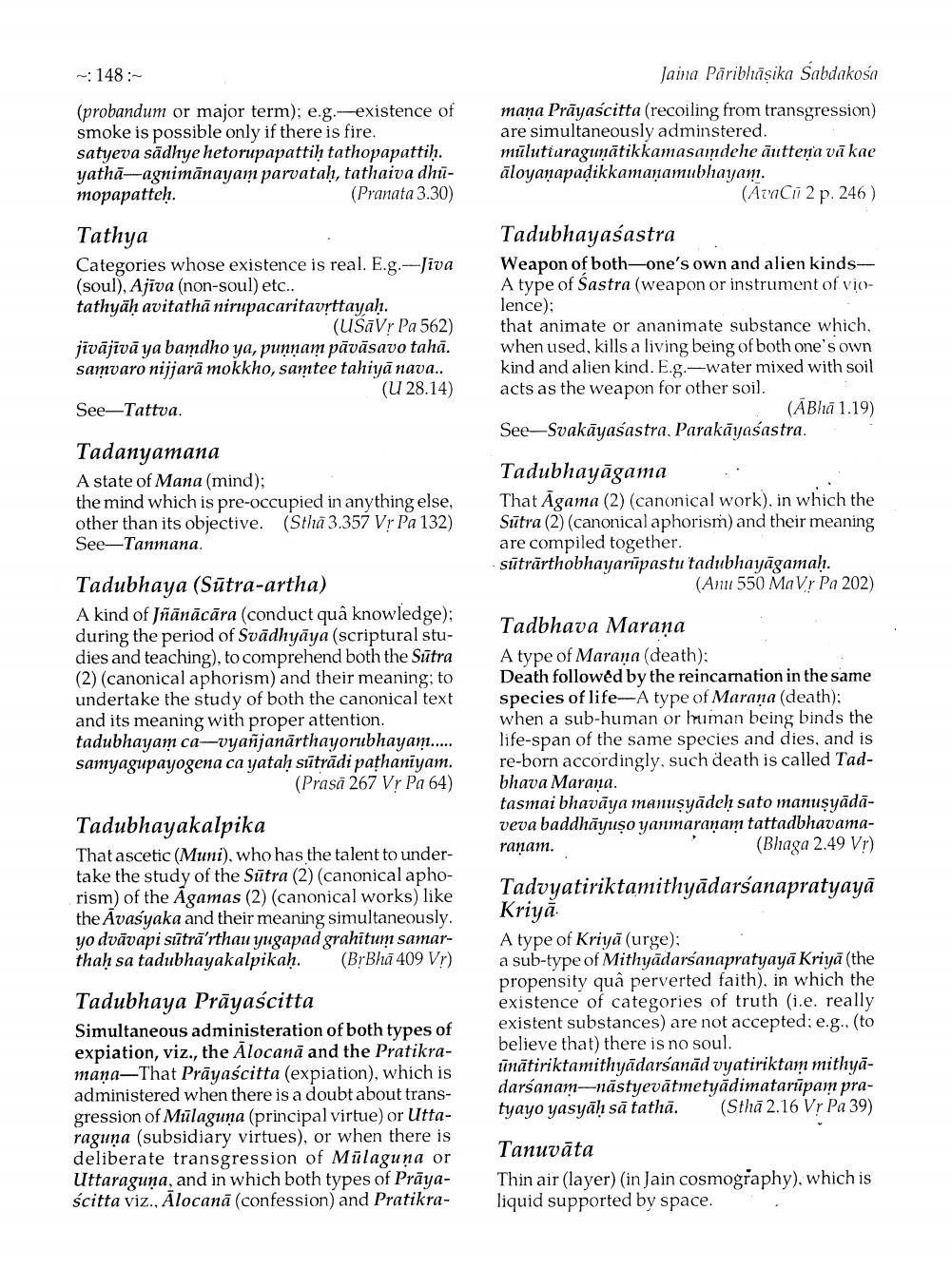________________
- 148:
(probandum or major term); e.g.-existence of smoke is possible only if there is fire. satyeva sādhye hetorupapattih tathopapattih. yathā-agnimānayam parvatah, tathaiva dhumopapatteh.
(Pranata 3.30)
Jaina Pāribhāșika Sabdakośa maņa Prāyascitta (recoiling from transgression) are simultaneously adminstered. mülutiaragunātikkamasaindehe āutteņa vā kae āloyanapadikkamaṇamubhayam.
(AVOC1 2 p. 246)
Tathya Categories whose existence is real. E.g.---Jiva (soul), Ajīva (non-soul) etc.. tathyāḥ avitathā nirupacaritavrttayah.
(USĪVr Pa 562) jivājīvā ya bamdho ya, punnam pāvāsavo tahā. samvaro nijjarā mokkho, samtee tahiyā nava..
(U 28.14) See-Tattva.
Tadubhayaśastra Weapon of both-one's own and alien kindsA type of Sastra (weapon or instrument of violence); that animate or ananimate substance which, when used, kills a living being of both one's own kind and alien kind. E.g.-water mixed with soil acts as the weapon for other soil.
(ABlā 1.19) See-Svakāyasastra, Parakāyasastra.
Tadanyamana A state of Mana (mind); the mind which is pre-occupied in anything else, other than its objective. (Sthā 3.357 Vr Pa 132) See-Tanmana.
Tadubhayāgama , That Agama (2) (canonical work), in which the Sūtra (2) (canonical aphorism) and their meaning are compiled together. sūtrārthobhayarūpastu tadubhayāgamaḥ.
(Anu 550 Ma Vr Pa 202)
Tadubhaya (Sūtra-artha) A kind of Jñānācāra (conduct quâ knowledge); during the period of Svädhyāya (scriptural studies and teaching), to comprehend both the Sūtra (2) (canonical aphorism) and their meaning; to undertake the study of both the canonical text and its meaning with proper attention. tadubhayam ca-vyañjanārthayorubhayam.... samyagupayogena ca yataḥ sütrādi pathaniyam.
(Prasa 267 Vr Pa 64)
Tadbhava Maraņa A type of Marana (death); Death followed by the reincarnation in the same species of life- A type of Marana (death); when a sub-human or human being binds the life-span of the same species and dies, and is re-born accordingly, such death is called Tadbhava Marana. tasmai bhavāya manusyādeh sato manusyādāveva baddhāyuşo yanmaraṇam tattadbhavamaranam.
(Bhaga 2.49 Vr)
Tadubhayakalpika That ascetic (Muni), who has the talent to undertake the study of the Sūtra (2) (canonical aphorism) of the Agamas (2) (canonical works) like the Avasyaka and their meaning simultaneously. yo dvāvapi sitrā'rthau yugapad grahitum samarthaḥ sa tadubhayakalpikah. (BỊBhā 409 Vr)
Tadubhaya Prāyaścitta Simultaneous administeration of both types of expiation, viz., the Alocanā and the Pratikramana—That Prāyascitta (expiation), which is administered when there is a doubt about transgression of Mülaguna (principal virtue) or Uttaraguna (subsidiary virtues), or when there is deliberate transgression of Mülaguna or Uttaraguņa, and in which both types of PrāyaŚcitta viz., Alocană (confession) and Pratikra
Tadvyatiriktamithyādarśanapratyayā Kriya A type of Kriyā (urge); a sub-type of Mithyādarśanapratyayā Kriyā (the propensity quâ perverted faith), in which the existence of categories of truth (i.e. really existent substances) are not accepted:e.g., (to believe that) there is no soul. inātiriktamithyādarsanād vyatiriktam mithyadarśanam---nästyevātmetyādimatarūpam pratyayo yasyāḥ sā tathā. (Sthā 2.16 Vr Pa 39)
Tanuvāta Thin air (layer) (in Jain cosmography), which is liquid supported by space.




